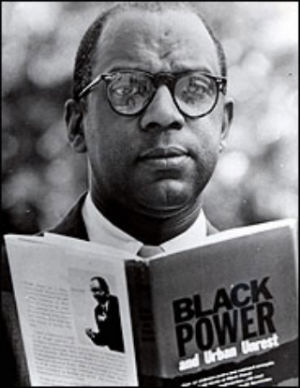
Black Power advocate Nathan Wright, Jr. was born on August 5, 1923 in Shreveport, Louisiana. He and his brother and sisters grew up in Cincinnati, Ohio. Wright attended St. Augustine’s College in Raleigh, North Carolina, in 1941 and 1942 and then transferred to Temple University in Philadelphia, Pennsylvania, in 1943 and 1944. He served in the U.S. Army Medical Administrative Corps during World War II.
After the war, Wright returned to school and graduated from the University of Cincinnati in 1947. The same year, he joined the Journey of Reconciliation which was sponsored by the Congress of Racial Equality and the Fellowship of Reconciliation, a religious peace organization. Wright and seven other African Americans, accompanied by eight whites, rode together on buses in the upper South, publicizing the 1946 decision of the U.S. Supreme Court that outlawed segregation on interstate buses.
Religion became a major part of Wright’s life. He earned a bachelor of divinity and master’s degree from the Episcopal Theology School in Cambridge, Massachusetts, in 1950. He worked as rector of St. Cyprian’s Church in Boston and chaplain of the city’s Children’s Medical Center in the 1950s and early 1960s. Wright also devoted time to public service. He served on the Massachusetts Governor’s Advisory Committee on Civil Rights.
After earning a doctorate in education from Harvard University in 1964, Wright moved to Newark, New Jersey, and served in the Department of Urban Work of the Episcopal Diocese. The mid-1960s saw the emergence of the Black Power movement. Confronted with white resistance to integration in the South and widespread racist practices in the North, leaders of the Student Nonviolent Coordinating Committee (SNCC) declared that any progress for African Americans could only come through organization and activity separate from whites. Dr. Wright agreed with them and strongly advocated Black Power. In 1967, he chaired the National Conference on Black Power held in Newark in the wake of a race riot in the city. Over 1,000 delegates from 126 cities representing 286 African American organizations attended the conference. Wright wrote two books on the Black Power movement, one of them the popular Black Power and Urban Unrest (1967).
Dr. Wright went on to have a prominent academic career. He wrote many other books, most of which dealt with race relations in America. In 1971, he became a professor of Urban Affairs and founding chair of the Department of African and Afro-American Studies at the State University of New York at Albany. He lectured at various colleges and universities throughout the country.
In 1981, Wright moved to Paterson, New Jersey, and served as Director of Communications at Passaic County Community College. He traveled extensively in the 1990s, lecturing on behalf of the Episcopal Church and helping to maintain its connection to civil rights.
Nathan Wright Jr. died at his home in East Stroudsburg, Pennsylvania, on February 22, 2005 at the age of 81. He was survived by his wife, two sons, and three daughters.

